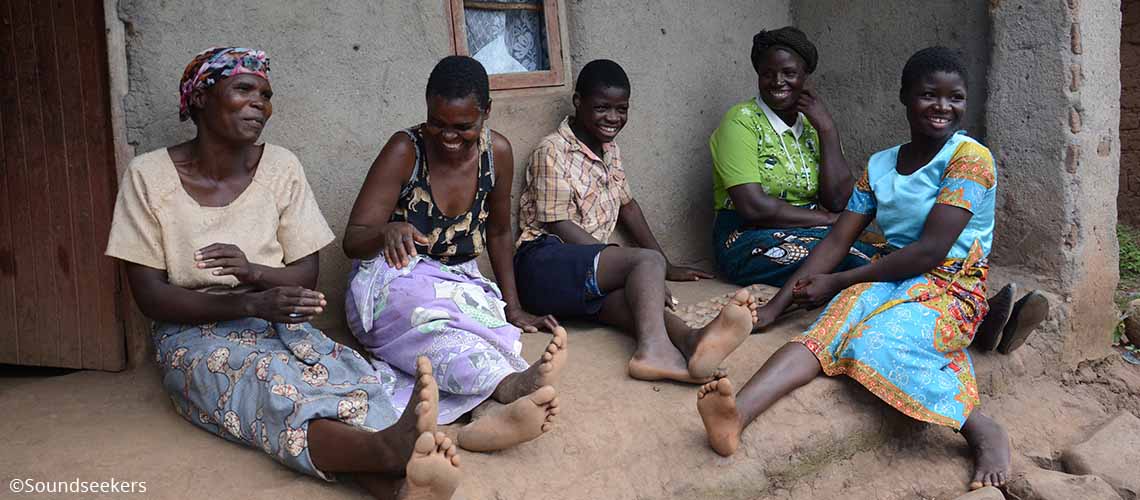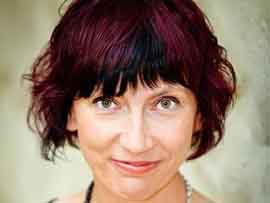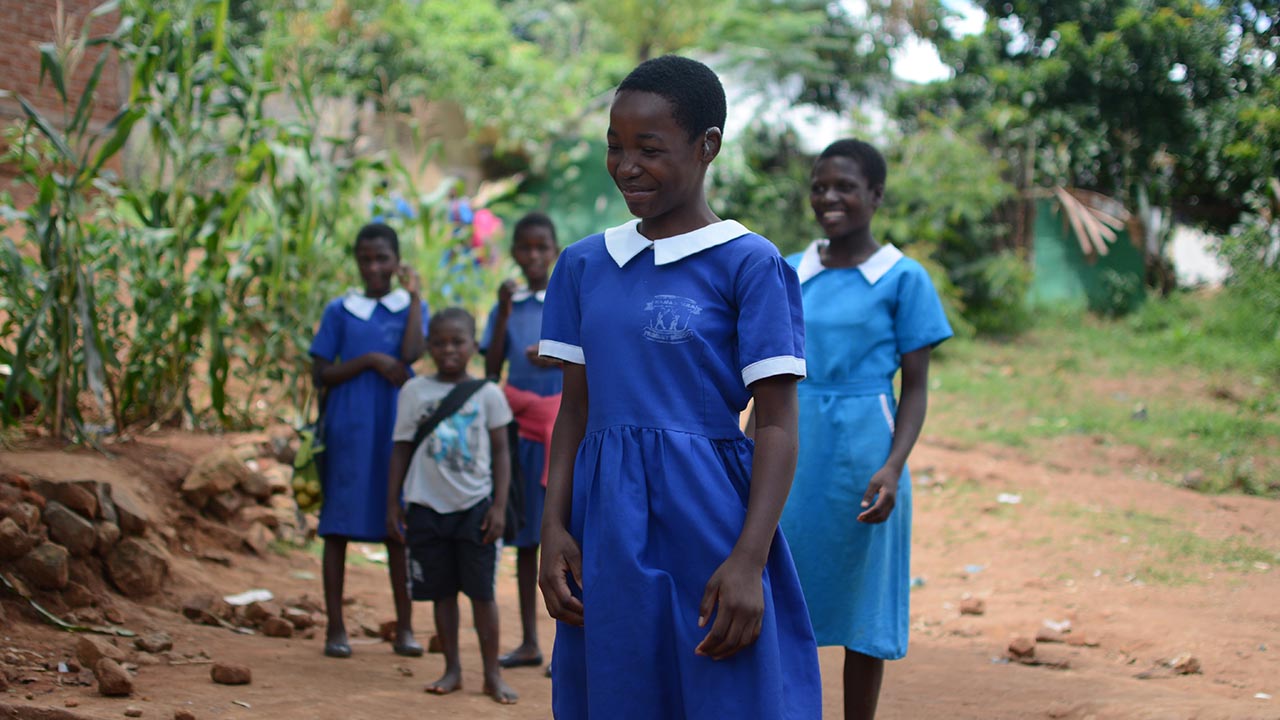Training Malawi’s first audiologists
In the UK there is one audiologist for every 25,000 people. In Malawi, audiology services for the entire country were run by just a few foreign volunteers. That was until four Malawian students travelled to Manchester to train as the country’s first qualified audiologists.

80% of people with hearing loss live in low to middle-income countries. In Malawi, one of the poorest countries in the world, hearing loss is both a cause and effect of poverty.
Not only is hearing loss often caused by preventable diseases such as HIV, malaria, mumps and measles, but it has a huge impact on access to education, employment and economic independence.
Access to audiology services, therefore, can make a real difference to the lives of those affected by this disability.
The country’s first audiology service was only established in 2013 at the ABC Hearing Clinic in the capital city Lilongwe, by Australian couple Peter and Rebecca Bartlett.
This was followed a year later by a second clinic at the Queen Elizabeth Central Hospital in Blantyre in the south of the country. This was opened under the direction of American audiologist Dr Courtney Caron and was funded by Sound Seekers, a charity working in Africa to help people with hearing loss access healthcare and education.

Dr Kai Uus
Kai is a Reader in Audiology and teaches on both undergraduate and postgraduate audiology courses.
Aspiring audiologists
Chikondi Chabaluka, Mwanaisha Phiri, Fletcher Chisalipo and Gospel Mangwiro were all working as assistants in these facilities when they were picked by Sound Seekers to take up places on the University’s MSc Audiology course in 2015.
Dr Kai Uus was the academic advisor to the four students during their time at the University.
“Sound Seekers approached us and told us about this plan and we thought it was absolutely fantastic,” she explains.
The one-year postgraduate course blends scientific theory with weekly practicals, and the students also got to put their experience to practice on short clinical placements in local NHS hospitals.
“They were really very motivated and good students”, says Kai. “Coming from a different academic background is always a challenge - and the MSc is a very challenging course for anyone, let alone for people who have to learn so quickly - but they were just so eager to learn.“
Fortunately help was on hand from the University and the charity to help them adapt to study in a foreign country.
“We tried to create a real partnership with Sound Seekers,” says Kai, “whereby they were very supportive of the students and we had some extra support in place, because we were very aware that being in a different academic culture is a challenge for anyone.
“We really wanted to make sure that their experience was as positive as possible.
“They were also a great support for each other. Having come to this university as an overseas student myself, I very much can relate to the value of having someone to support you in a foreign country.

Training Malawi’s first audiologists. Image © Soundseekers
A sustainable service
As one of the least developed countries in the world, Malawi is heavily dependent on foreign aid. That’s why building an infrastructure for audiology services that can be sustained by people in Malawi is crucial.
Sound Seekers funded Chikondi and Mwanaisha’s studies, as well as Fletcher and Gospel’s living expenses in Manchester, so that they could then return to Malawi and take over the leadership of the services.
“One of the main issues around audiology in Malawi is that there is a lack of specialists”, explains Kai.
“The idea for Sound Seekers was to set up services with the students when they returned home, and support them to make sure once they had finished their academic training at Manchester that they were supported in their clinical practice.”
Fletcher, who now works as an audiologist at the ABC clinic agrees. Speaking to Hear The World in 2017, he said: “We are Malawians, we know the real situation in Malawi and I think we are the people to help Malawians in this field.”
"No one understands Malawians as well as we do and we are very happy that we can now look after our people ourselves."
Close links
Although the students are now settled back in Malawi, busy with their own clinical practice following 18 months of supervision, staff at the University stay in touch and provide them with ongoing support.
“Many members of staff are in touch with them personally,” says Kai.
“For example, Debbie Caine – who is a specialist in balance disorders here – has been providing them with advice as there is absolutely no service for people with these disorders in Malawi.
“She’s been really helpful in making sure they can support their patients with these problems.”
“We are Malawians, no one understands Malawians as well as we do and we are very happy that we can now look after our people ourselves.”
Inspiring others
For Mwanaisha and Chikondi, they welcome the chance to help others, improve access to education and inspire young girls to take up the profession of audiology.
“As an audiologist it feels so great to see someone doing well after getting the services I provide”, says Mwanaisha.
“This is a privilege not only to me, but also to the country of Malawi, because I will be acting as a role model to the young ladies.”
“For girls with hearing loss it is really hard for them to have a good life in Malawi,” adds Chikondi.
“They don’t have the confidence they will be someone in the future, just because of this disability they have.
“So we are changing the mindset of people, we are doing hearing loss awareness and also ear health, in churches and schools.
“It keeps me going every day, because I have in mind that I am helping someone to communicate better. I help a person to have an impact on their life so that they can hear again.”
Hosting the Malawians was a positive and inspiring experience for Kai and the team at Manchester too.
“Working with these students is one of the best things I’ve ever done,” she says.
“Mwainisha told us how she lived in a small village with her husband and children. She decided to study nursing, and it was a very traditional village so at first everyone looked down on her”.
“But she is the most determined, headstrong woman I’ve ever met. She graduated very successfully and then suddenly others in the village were like ‘I want to do that’. And I think it’s just a lovely example of how you can change things not only for yourself and your family but for the whole community.
“Having experienced students like that who bring their own stories, it’s a real inspiration. They go and they actually change people’s lives. It’s the biggest privilege you can have in life that you are actually in your own way affecting people’s lives for the better in another part of the world,” concludes Kai.
With four newly-qualified audiologists, outreach services delivering care in remote rural areas, plus newborn hearing screening – a technique pioneered at Manchester – being trialled in the country, the future of audiology services in Malawi looks promising.
Find out more about postgraduate study in audiology at The University of Manchester.
